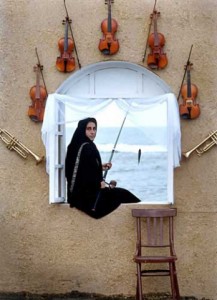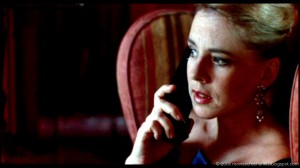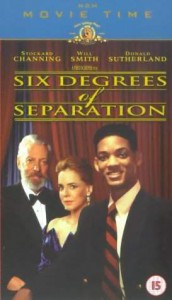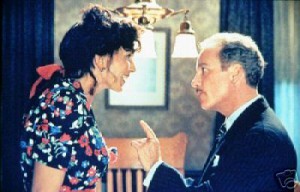From the Chicago Reader (October 1, 1994). — J.R.

This 1993 film by the eclectic and talented Iranian filmmaker Mohsen Makhmalbaf (The Peddler, Marriage of the Blessed) is a contemporary semitragic farce about a burly film actor who wants to act only in art films but is forced by his family’s economic demands to do a string of trashy commercial movies. His tormented wife, infertile and obsessed with having a baby, insists that her husband marry and impregnate a second wife, a deaf-mute Gypsy, to provide them with a child. What keeps this picture frenetic, apart from the hysterical action and satirical treatment of the Iranian media, is the couple’s surreal, high-tech home and Makhmalbaf’s hyperbolic, eccentric mise en scene, which fit together hand and glove (as they were undoubtedly designed to do). The three lead actors — Akbar Abdi (playing some version of himself), Fatemeh Motamed Aria, and Mahaya Petrossian — were all in Once Upon a Time, Cinema, Makhmalbaf’s previous feature; there appear to be some cross-references (such as the hero’s Chaplin worship), but here the tone is more caustic, the inventiveness more pointed. The meanings of both films are less than entirely clear, but my hunch is that each is a comic allegory about the rift between traditional and contemporary Iran, in which class differences and cultural differences are equally pertinent. Read more
From the Chicago Reader (December 24, 1993). — J.R.

A young hustler (Will Smith) claiming to be the son of Sidney Poitier cons his way into the upper-class Manhattan household and affections of a middle-aged couple (Stockard Channing and Donald Sutherland), with disquieting and soul-searching consequences once his fraud is discovered. John Guare adapted his own play by transplanting the action from a bare stage to a variety of realistic locations, most of them in Manhattan, and has fortunately (and daringly) retained the highly theatrical language of the original. Fred Schepisi’s razor-sharp direction makes it both sing and soar as it explores some of the social gulfs and philosophical crevices that define contemporary urban life. The movie basically belongs to Channing, who gives it both moral force and heat, but with an audacious lesson in making the theatrical cinematic Schepisi does a superb job as well. Fine Arts.
 Read more
Read more
From the Chicago Reader (May 1, 1993). — J.R.

As in Rambling Rose, director Martha Coolidge does an interesting and effective job here of reinterpreting from a woman’s perspective autobiographical and nostalgic material written by a man. This time the material is an adaptation by Neil Simon of his own play about living for a spell in Yonkers in 1942 (Brad Stoll plays the narrator-protagonist at age 15) with his younger brother (Mike Damus), bitter and tyrannical grandmother (Irene Worth), and wacky aunt (Mercedes Ruehl), while his widowed father (Jack Laufer) struggles in the south to pay off some debts. Ironically, the movie comes into its own only in scenes from which the teenage hero is absent; the rest of the time it is charming Simon material without much staying power. Richard Dreyfuss plays a criminal uncle who briefly hides out with the family and David Strathairn’s a slow-witted movie theater usher the wacky aunt wants to marry. (JR)
 Read more
Read more





